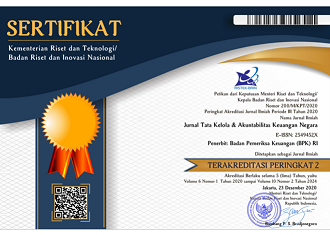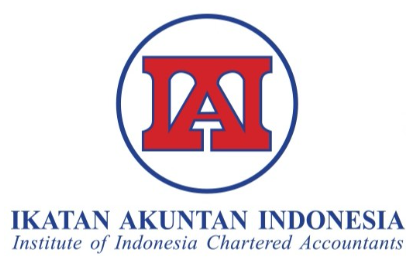ENHANCING BPK RI'S AUDIT DESIGN FOR PEOPLE'S WELFARE: A PRACTICAL APPROACH
DOI:
https://doi.org/10.28986/jtaken.v1i2.25Keywords:
Welfare, Audit Design, Planning, RPJMNAbstract
The 2016-2020 Strategic Plan of BPK RI necessitates audits to be conducted to advance people's welfare to the greatest extent possible as a reflection of the growing maturity of BPK RI as an accountability organization. This would require BPK RI to be able to examine and evaluate whether the government's development programs under RPJMN have achieved the desired outcomes or impact of increasing people's welfare. This paper aimed to find a practical approach to enhance BPK RI's audit design in order to be able to contribute to the optimization of people's welfare as required under the new vision of Renstra 2016- 2020. The authors use their experience on the recent formulation of BPK RI's Audit Policy 2016- 2020 (Kebijakan Pemeriksaan 2016-2020), in which the authors are actively involved. The authors also use reviews of existing audit design and study on the relevant theoretical and academic literature that provide the overarching study framework. The study concluded that BPK audits should be designed toward national development programs in RPJMN 2015-2019 which correlate directly with or possessing great leverage in the achievement of welfare indicators.
Abstrak
Renstra BPK 2016-2020 mensyaratkan pemeriksaan-pemeriksaan BPK dilaksanakan sedemikian rupa sehingga dapat mendorong terwujudnya pembangunan untuk sebesar-besar kemakmuran rakyat sebagai refleksi dari peningkatan kematangan BPK. Pemeriksaan BPK diharapkan mampu menilai dan mengevaluasi apakah program-program pembangunan yang didesain atau ditetapkan dalam RPJMN telah mencapai outcome maupun dampak yang diinginkan yaitu meningkatkan kesejahteraan masyarakat. Studi ini bertujuan untuk mencari pendekatan praktis untuk memperkuat desain audit BPK agar dapat berperan untuk meningkatkan kesejahteraan rakyat seperti yang disyaratkan dalam Rentstra 2016-2020. Penulis menggunakan pengalaman profesional dalam membangun formula Kebijakan Pemeriksaan BPK 2016-2020, dimana penulis terlibat aktif dalam penyusunannya. Selain itu penulis juga menggunakan reviu atas desain audit yang ada saat ini serta studi literatur dalam sebagai bahan analisa studi. Hasil studi menyimpulkan bahwa pemeriksaan BPK seharusnya di desain untuk sesuai dengan RPJMN2015-2019 yang berhubungan langsung dengan indikator kesejahteraan.
References
Azis, H. A. (2015). Sambutan Ketua BPK RI Dalam Pembukaan Rapat Kerja Pelaksana BPK. Presentation at BPK RI Coordination Meeting, 10 August 2015.
BPK RI Directorate of Strategic Planning and Performance Management. (2015). Konsep Rencana Strategis 2016-2020.
Bryson, J. M. (2004). Strategic Planning For Public And Nonprofit Organizations: A Guide to Strengthening and Sustaining Organizational Achievement. 3rd Edition. San Francisco: Jossey-Bass.
Indonesia's Coordinating Ministry for People Welfare. (2014). Indeks Kesejahteraan Rakyat (IkRAR), Buku 1. Jakarta: Indonesia's Coordinating Ministry for People Welfare.
INTOSAI Development Initiative. (n.d.). ISSAI Implementation Handbook: Performance Audit.
INTOSAI. (n.d.-a). ISSAI 12: The Value and Benefits of Supreme Audit Institutions: making a difference to the lives of citizens. Vienna: INTOSAI.
INTOSAI. (n.d.-b). Fundamentals of Public Sector Auditing. Vienna: INTOSAI.
Leibfried, S., & Obinger, H. (2001).Welfare state futures: an introduction, in Stephen Leibfried (ed.), Welfare State Futures. Cambridge: Cambridge University Press.
Marcuzzo, M. C. (2010). Whose Welfare State? Beveridge Versus Keynes in No Wealth but Life: Welfare Economics and the Welfare State in Britain, 1880- 1945, Roger Backhouse and Tamotsu Nishizawa (eds.). New York: Cambridge University Press.
Negara, I. G. B. S. (2015). Toward Implementation of Accrual Basis in Indonesia Government: Key Success Factors. GSTF Journal on Business Review, 4 (1).
Putri, T. A. (2014). BPK: Tak Ada Hubungan Opini WTP dan Kesejahteraan. Retrieved from http://bisnis.tempo.co/ read/news/2014/12/15/087628607/ bpk-tak-ada-hubungan-opini-wtpdan-kesejahteraan (10 October 2015).
Roos, J.P. (1973). Welfare theory and Social Policy: A Study in Policy Science. Helsinki: Societas Scientiarum Fennica.
Soubbotina, T. P. (2000). Beyond economic growth: meeting the challenges of global development. Washington: The World Bank.
Sumner, A., & Tribe, M. (2008). International Development Studies: Theories and Methods in Research and Practice. London: SAGE Publications.
UNDP. (2014). Sustaining Human Progress: Reducing Vulnerabilities and Building Resilience, in Human Development Report 2014.
Van der Knaap, P. (2012). Making Performance Audits More Responsive in International Journal of Government Auditing, January 2012.
Walker, D. M. (2006). Modernizing Accountability Organizations in Times of Fiscal Constraint. Presentation at the National Intergovernmental Audit Forum, 1 December 2006.
Welfare. (n.d.). in Merriam-Websters online dictionary. Retrieved 1 October 2015, from http://www.merriam-webster. com/dictionary/welfare.
Welfare. (n.d.). in the Oxford online dictionary. Retrieved 1 October 2015, from http://www.oxforddictionaries.com/definition/english/welfare.
Welfare State. (n.d.) in Encyclopaedia Brittanica. Retrieved 1 October 2015, from http://www.britannica.com/ topic/welfare-state.
Downloads
Submitted
Accepted
Published
How to Cite
Issue
Section
License

Jurnal Tata Kelola dan Akuntabilitas Keuangan Negara is licensed under
a Creative Commons Attribution-ShareAlike 4.0 International License




















